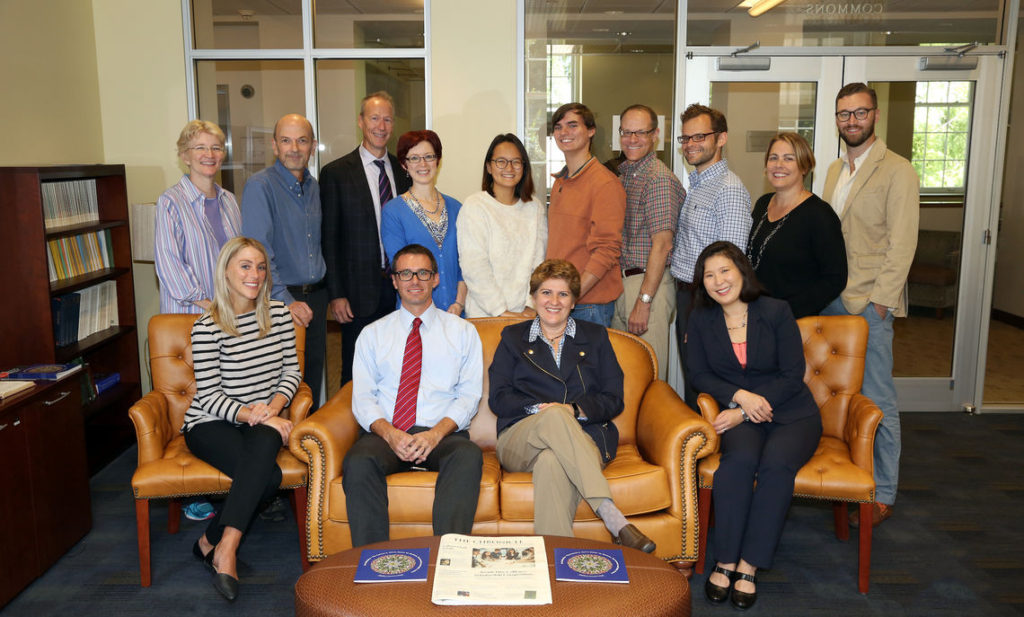By Katherine Coble || Layout Assistant

The hectic, unpredictable, and unprecedented election season of 2016 comes to a conclusion this Tuesday night, and F&M’s Government Department is prepared. The department will sponsor an election night viewing party beginning at 6:30 p.m. on Tuesday in the Steinman College Center. The event is held in conjunction with F&M Votes, the College Democrats, and the College Republicans. There will additionally be a ‘brown-bag’ discussion from 12 to 1 p.m. on Friday, November 11 in the Academy Room of Shadek-Fackenthal Library with Professors Steven Medvic, David Ciuk, and Elspeth Wilson to debrief the results of the election and its consequences.
News organizations call presidential races state-by-state, beginning when the the first polls close around 7:00 p.m. on the East Coast. Using their own metrics, models, and exit polls, media outlets use as much data as is available to them to call states for one candidate or another. The process itself can take several hours because these news sources are hesitant to get calls wrong and rarely rush to an announcement.
While media coverage of politics and campaigns has become increasingly more polarized in recent years, elections night coverage itself tends to have less bias. “I don’t think [polarization] has a huge impact, because on election night, the results are the results”, says Franklin & Marshall Professor of Government, Stephen K. Medvic. “Above everything else, believe it or not, they are trying to be as accurate as possible in making these calls, because otherwise it is embarrassing for them.”
Medvic points to the disputed 2000 election between George Bush and Al Gore as a turning point in how American media covers election night, attempting to get the call right instead of get the call first. “The networks learned a lot from 2000, and I think they’ve attempted to not make a call unless they are absolutely certain it’s accurate… They lost a lot of credibility in 2000, and so now they do prioritize accuracy over speed.”
Medvic, who predicts that Clinton will take the presidency and the state of Pennsylvania, but not Lancaster County, suggests viewers on Tuesday night look out for the results of specific swing states such as New Hampshire, Virginia, North Carolina, Florida, Ohio, or Pennsylvania. “I would be watching for battleground states to see how they’re going, and if there are any calls that go against what we are expecting.” A candidate winning an unexpected battleground state can suggest a night in their favor, while a candidate losing a state they were polling ahead in (or even not winning by as large of a margin as anticipated) could be an omen of disappointment to come.
Though election night coverage may appear “boring” at first glance—calling states happens slowly and is rarely a dramatic affair—Franklin & Marshall students can gain a lot by watching a news organization’s coverage itself. The time in between calling the results is filled with debriefs and discussions regarding the current state of America, its political system, and the recently-run campaigns. There is frequently debate over the nuts and bolts of how presidential elections are run, such as the purpose of the United States Electoral College and the existence (or lack thereof) of voter fraud. Election night coverage can be useful beyond its most basic purpose of informing citizens of the poll results. It can promote discussion, reflection, and deeper thought on U.S. political affairs.
Medvic hopes the brown-bag lunch discussion follows in this vein, as a way to help F&M students unpack all the intricacies of this one of a kind election season.
Though presidential campaigns and the election night results may provide entertainment and spark extreme emotions, there are plenty of questions left unanswered after all the results have been called. As Professor Medvic encourages, “I think it’s really important for us to think: What just happened? What are the consequences of that? Has it changed the way our campaigns are going to work? Has it changed our politics?”
“In some ways, the most important questions are raised after the election,” said Medvic.
First-Year Katherine Coble is a layout assistant. Her email is kcoble@fandm.edu.